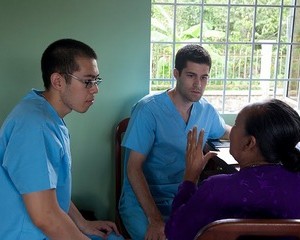For a better understanding of VNMAP’s operations and how it has helped shaped young medical minds, check out the reflections of Ryan Brennessel, a medical student and former participant, below.
***
Throughout my life, I have had the opportunity to travel to many parts of the world. As my mother worked for a major airline for nearly three decades, I was exposed to various cultures and lifestyles by the time I had reached the eighth grade. These incredible experiences allowed me to see all the usual highlights on any traveler’s itinerary, but what made more of an impact on me was witnessing first hand the extreme poverty and deplorable conditions outside usual tourist stops. Seeing people struggle to survive on so little made me appreciate what I have and what I have been given throughout my life. Being aware of this at such a young age, I vowed that one day I would get involved in giving back.
When I found out that I had been selected to be a medical student team member on the Viet Nam Medical Assistance Program’s 2010 mission trip, I realized that it would be a wonderful opportunity to make a difference. My trip into the rural regions of the Mekong Delta in Viet Nam further opened my eyes to the healthcare disparities that exist globally.
The team I worked with consisted of physicians, pharmacists, translators, volunteers, physician assistant students and fellow medical students who worked feverishly in oppressive heat and poverty stricken villages over the course of two weeks to examine up to, and sometimes more than, two hundred people per day. Days began early, starting with the loading of a small bus with medicine and medical supplies and a long drive through narrow roads that cut through rice paddies and vegetation. Our final destination changed each day, but we usually ended up at a rundown school house or government building that we would then transform into a makeshift clinic. Goals included providing basic screenings, medication, nutritional supplements, patient education, as well as financial support and follow-through for extreme case referrals to city hospitals. Data was collected for a collaborative study on hypertension—a burdening issue for many Vietnamese—with the goal of better understanding how to treat it. (Hopefully, with this knowledge, the people of rural Viet Nam can be cared for on a more long-term and sustainable basis.) Surplus medical supplies from clinic days were collected and personally delivered to orphanages, shelters for mentally disabled and blind children, non-profit clinics, and a senior care center.
The impact the mission had on me cannot be described in words. The program did more than just provide for the underserved of Viet Nam; it also gave me the educational experience of a lifetime. It allowed me to increase my awareness of the human condition, and explore particular areas of medicine where I can make a significant contribution. The trip offered insight into an amazing culture that was both very different, yet principally similar at the same time. Many of the diseases and ailments I had spent months reading about and studying in text books now had an unforgettable face and story. There were opportunities to work beside Vietnamese and American doctors and watch them care for patients with the utmost display of compassion. I observed interactions that no textbook can teach an aspiring physician. It was an honor to be a part of a team that worked tirelessly in less than optimal conditions to help those who are less fortunate. For me, this mission was not just the fulfillment of a desire to travel, but a step in the direction of becoming a competent and caring physician both at home and abroad.
Correction: A previous version of this post misspelled the author’s name as Ryan Bressells. The correct spelling is Ryan Brennessel, as seen above.


Leave a Reply
You must be logged in to post a comment.